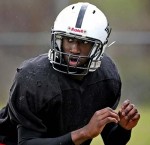
After the death of Catamount football player Ja’Quayvin Smalls, Western Carolina University has decided to begin testing African-American athletes for the sickle-cell anemia trait.
Smalls, a junior defensive back from Mount Pleasant, S.C., died July 8 after collapsing during a sprint workout at a voluntary, off-season practice in Cullowhee. Observers on the scene say that Smalls was complaining about cramps during the beginning of sprint exercises, and was removed from the lineup to be stretched. While being treated by trainer Brandon King, Smalls quit breathing around 6:25pm, at which point athletic training personnel administered CPR until emergency medical personnel arrived at the stadium. He was transported to Harris Regional Hospital, where he died at approximately 7:30pm.
Cause of death has not been determined, although an autopsy was performed the day after he died and he passed a physical exam on July 7. Dr. Larry Selby, the coroner who performed the autopsy, has not been available to answer questions. Brian Thomas, the public relations coordinator for WestCare Health System/Harris Regional Hospital, said he did not know what tests were conducted on Smalls, whether preliminary results showed any abnormalities in Smalls heart or whether he carried the sickle-cell anemia trait.
The trait, which affects an estimated eight percent of the country’s African-American population, causes a condition known as exertional sickling. In as little as two minutes of intense exercise, red blood cells can contort from their normal disc shape into a crescent shape, or the sickle of the syndrome’s name. This occludes blood flow in athletes affected by sickle-cell anemia, and when this happens, athletes in any sport can die very quickly.
The disease has been the cause of seven of 19 non-trauma deaths among college players in the last decade, according to an NCAA committee studying the issue. In June, the NCAA recommended to its schools that all African-Americans be tested for sickle-cell disease.
On Monday, Aug. 3, Western Carolina athletic director Chip Smith said that testing will be mandatory at his school beginning in the fall.
“We have evaluated all of the procedures involved with the conditioning and evaluation of student-athletes preparing for practice and competition,” Smith said. “As part of that review, we have incorporated testing for the sickle-cell trait.”
Appalachian State also is testing African-American athletes for the first time this year, although the decision to do so came before the death of Smalls, according to Mike Flynn, the school’s sports information director.
Mandatory football practice at Appalachian State and Western Carolina began over the weekend.






